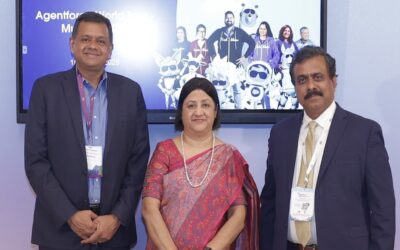In an interaction with the media at the Google Cloud Summit in Mumbai last month, Rick Harshman, Managing Director, Asia Pacific, Google Cloud spells out his strategy for expanding the partner ecosystem on the Google Cloud Platform. He explains the differentiating factors that are attracting more organisations and developers to the platform.
DC: What has Google achieved in the past six months to one year in India?

Rick Harshman, Managing Director, Asia Pacific, Google Cloud
Rick Harshman: We want to help organisations synthesize and work with Google Cloud. Within the India region, we have more than tripled the team since last year, across sales, professional services, partners, marketing, and customer engineering.
We now have offices in Mumbai, Bengaluru and Gurgaon. And we are spending time with programs in tier-2 cities, especially around training and enablement.
We are working really hard with our customers and we are also building out our partner ecosystem. This is categorised around global systems integration companies like Wipro or TCS, as well as regional systems integration companies or the born in the cloud SI companies.
We also work closely with technology partners such as SAP, Salesforce, Cisco.
DC: We see a lot of demand for training on Google technologies. How are you responding?
Rick Harshman: The last time we did a summit in India (six months ago), the number one request we got was for more training. Developers wanted more engagement on Google cloud technologies. Ever since, we have seen an 825% increase in Google training. So India is now leading the globe when it comes to training on Google Cloud.
We are launching two new things. One is a new course on machine learning via Coursera. The second thing is, we are announcing an associate certification around machine learning.
India has a great developer ecosystem and there is a huge desire to learn, and a thirst to leverage the latest technologies, which Google Cloud enables and provides.
Related stories about Google Cloud Platform
Want business success? Create a machine learning model
How Google helps Truecaller block spam messages
DC: Apart from training, what else are you doing to support Indian developers?
Rick Harshman: Developers want to interact with the platforms that are most innovative. We find that developers want to run the managed TensorFlow services or managed machine learning capabilities on Google Cloud. They know that we are managing those instances or models on their behalf.
When our engineering team is designing those services, they think about developers and design the services for developers. It’s about simplification, ease of use etc. For instance, we have a service called Dialogflow that allows you to create your own chatbot — without writing a line of code.
Services like these enable developers to quickly create applications, without going through the process of getting a new (physical) server and installing it. There are additional costs for power and the cooling. And if the project does not work it is a waste of time and money.
It will just cost a few rupees to deploy a (virtual) server on the cloud. If your project works you can let it scale; only the cloud can offer that.
DC: What are the new services that Google recently launched for the Mumbai region?
Rick Harshman: We launched two new services: Cloud Spanner and Key Management service.
Key Management Service enables an end customer to have control on their encryption keys. Customers want to keep their information in the country, and naturally they want to keep their keys in the country as well.
Cloud Spanner is the only enterprise data base that is globally distributed. The service revolutionizes database administration and management and makes application development more efficient.
DC: What are your biggest strengths as compared to your cloud competitors?
Rick Harshman: We are by far the most open cloud provider in the way we are interacting with different companies, different partners, and then contributing back to the ecosystem in the open source community.
The other strength is Security. When you move a project to Google Cloud you remain on our network and backbone. So you get better quality of service and performance. You also get better security because we encrypt that end-to-end. Data is encrypted in transit and at rest. Every bit is encrypted. That’s a huge differentiator.
On top of that, there are over a thousand security experts looking at this (your data and applications) around the clock. For instance, every minute we are blocking 10 million spam messages on Gmail.
We have to ensure the highest level of security and operational excellence (uptime, availability). We have to provide that level of confidence to our customers. We need to be able to provide the tools to companies to protect themselves, and to be able to meet their regulatory requirements as well. So, the way we fundamentally design our services and our infrastructure is different from other companies.
There are two other differentiators on the technology side. Analytics is fundamental to Google. How companies make sense of their data is a big differentiator. The second is machine learning and artificial intelligence.
Machine learning is not a proliferated skill and there are only tens of thousands of machine learning experts. So you just give us your files and data and we will create machine learning models that will be more accurate over time. We are years ahead of other companies in this. We use TPUs (Tensor Processing Units) to do that.
The last thing is the wider Google ecosystem. The way we can work with developers around Android; the way we can work with customers around ads. The way we work around search. And there is a lot of opportunity there as well.
DC: In which industries do you see a lot of traction?
Rick Harshman: We are seeing that across industries, whether it is retail, manufacturing, FMCG, e-commerce, telco, airlines. All of those industries are rapidly adopting cloud. Apart from retail, media and entertainment, we are also focussing on healthcare.
DC: Can you give us some use cases of how you are helping customers in India and globally with your platform and technologies?
Rick Harshman: Policybazaar.com has a billion minutes of talk time. That’s a lot of data. As an insurance provider, they want to offer a more personalised and prescriptive service to their end customers. But they want to reduce the amount of interaction their agent would need to have with the customers. So they created these interactive chatbots leveraging Google Cloud’s technology, to be able to do that.
Ashok Leyland is a manufacturing customer.
There are a couple of global use cases. For instance, two high school students in the US leveraged TensorFlow (an open source machine learning framework) and created a device that you can put on a tree. It will take on data from the tree and will allow you to predict when and how forest fires are started. This leverages machine learning capabilities. We provide this technology for anyone to use.
The other use case is a Terrarium — to create different ecosystems and weather patterns. Someone has created a Terrarium leveraging machine learning so you can predict weather patterns in different climates.
L&T Finance uses the Gsuite productivity suite. This helps them collaborate more effectively. The CEO can collaborate with his executive team and work on the same document with others, at the same time. They do not need to send multiple versions to each other.
The next thing they are looking to do is to analyse all their data and look for who’s eligible for a loan. Analytics and machine learning can help in those business decisions.
Eighteen months ago, machine learning tools and capabilities were in the domain of only the largest companies and now we are making it available to anyone.
For instance, PolicyBazaar.com is using our machine learning services.
Several other large enterprises and emerging Indian businesses have chosen the Google Cloud Platform. These are: Truecaller, Hike Messenger, L&T Finance, Karur Vysya Bank, Titan, HDFC Sales, ShareChat, Quikr, Delhivery, Dr. Agarwal’s Eye Hospital, Yatra, Hero MotoCorp, SBI Cards, Rategain, Flexsol.
DC: You launched a region in Mumbai a few months ago. How many zones do you have in this region? Any plans to increase the number of zones?
Rick Harshman: We launched the Mumbai region about eight months ago. (To clarify) a region is multiple data centres. Within the region we have zones, which are data centres. We have three zones here in Mumbai. We might increase that depending on customer demand.
There is also the network connectivity that we have that extends into the wider Google network. In addition, we have edge locations and a cloud CDN (Content Delivery Network).
What is interesting to note is that before we launched the Mumbai region Hike was on another cloud and they migrated over and launched on us in Singapore. Once they migrated they observed that their performance from Singapore for the Indian users was faster than the other cloud provider running out of Mumbai.
Since the migration, Hike has seen a 25-30 percent reduction in latency, improving the overall user experience on its platform. Google Cloud is also allowing Hike to scale with efficiency and reduce its go-to-market time and effort.
That’s the power of the network. You don’t go with the public Internet as you are dependent on the ISPs.









